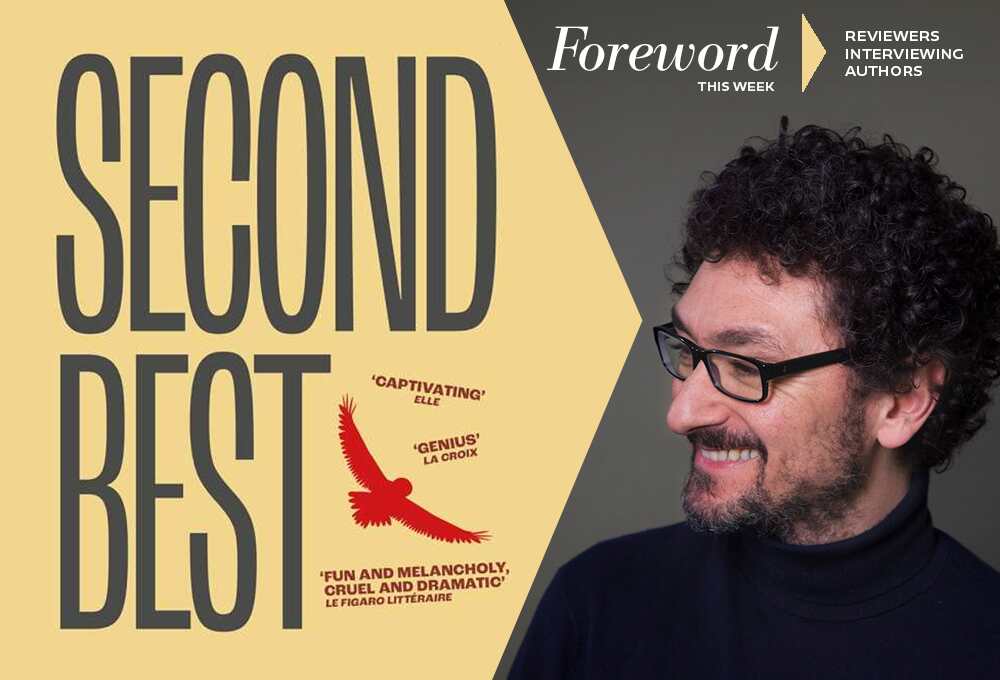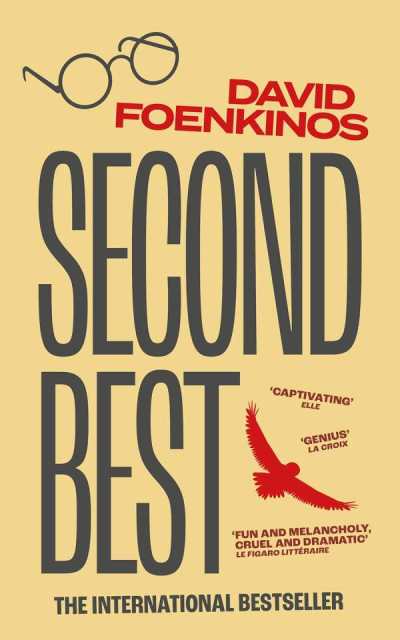Reviewer Willem Marx Interviews David Foenkinos, Author of Second Best

Losing is a big part of life: do you let it define you?
Perhaps not, but you didn’t have the role of Harry Potter snatched away from you at the last moment. That one might sting for a while.
Which is exactly the torture David Foenkinos sets up for ten-year-old Martin Hill in Second Best,—and hapless Martin “grows up blinded by the life he isn’t living.”
What might have been, Martin obsesses, if only I had won the role of a lifetime?
Talk about the perfect psychosis for a man of these half-virtual, mostly strange times.

Willem Marx stamped a star on his review for Foreword’s September/October issue, which included that brilliant “blinded by the life he isn’t living” line. And, as you’ll see, he and David play their reviewer-author roles deftly in the following conversation.
Second Best explores the life of ten-year-old Martin Hill, who made it to the final two in the casting for Harry Potter and wasn’t chosen. Where did this idea of the second-best-actor come from? Are you a fan of the Harry Potter series?
I am full of admiration for the work of JK Rowling and how she created an amazing universe, and grateful for all the young people reading thanks to her. For that, she deserves the Nobel Prize! But I was not especially a reader myself. I did see the movies with my son, and I discovered the casting story by chance. The casting director let out that there were two kids at the end of the casting process, and they hesitated for weeks to pick the actor for the role. I immediately thought about the other child. What would the life of the child who was almost Harry Potter be like? It offered the possibility to write a book about failure and how you can get over it. But in my story, there was a specific point: what about a child who failed and cannot stop imagining the life he could have had he succeeded? Can you imagine living with this?
Biography comes up a lot in this novel. Martin is described as “a man trying to escape his own biographer,” and later turns to writing his memoir as a therapeutic practice. What is the role of biography in Second Best? How do real people and events influence your writing?
This is a story about a character who wants to forget his failure. In the book he tries everything, from terrible things to the more humorous. At one point, he tries to write to feel better. But it just reminds him of his terrible situation. Writing about your life is sometimes a way to understand it, and it can help you put behind your traumas. But for me personally, it’s the opposite. Writing is a way to escape. But in the end, I do understand more about myself. In this case, the question is: how you can survive?
“In a film, this scene would have been in slow motion. But in a book…it’s difficult…to slow down…the pace of…the action…unless you use…ellipses…” This quixotic narration frequently interrupts the story with self-reflective jokes, anthropological observations, and advice proffered directly to readers. How did you land on this voice? Do you think of the narration as a distinct character in its own right?
I completely agree with this. But each book has his own voice. For me, this story deals a lot with what you know about the HP movies. Even if my book is not about HP, I wanted to create the story with little touches of magic. It was as if the story was bigger than life, like a movie. In fact, at one point in my story, the life of JK Rowling turns into a fairy tale. I had a lot pleasure writing about her amazing story in few pages. I didn’t know how desperate she was before becoming the most famous writer of the world.
Your work has been translated into dozens of languages. What relationship do you have to your translators and the translations of your texts? Can you please describe the process of having Second Best translated into English?
I love to discuss the language with my translators. I am very lucky to be translated everywhere. For the English, my first story was about “La délicatesse,” which is also a movie with Audrey Tautou. “La délicatesse” means in a delicate way. But there is no English word for this, so they called it “delicacy” which sounds the same but means something completely different. For Second Best, there is a funny story. The French title is “Numero Deux.” But my publisher told me: “Oh, I am sorry we can’t call your book “Number Two”! She explained what that phrase means in English.
Despite dealing with Martin’s crippling anxiety and sense of failure, the novel is infused with a paradoxical lightness. How did you approach dealing with such intense subjects? Were you intentionally balancing Martin’s despair with something more hopeful? Is there a feeling or idea that you wanted to leave with readers?
I really want this to be an optimistic book, so I don’t want to give away the ending. So, Martin does find a solution. But you are right. Even if it’s a tragic story, I still wanted to make it fun and humorous. Try to imagine the story of someone who tried to avoid HP in our society? It’s almost impossible. That is why he goes to The Louvre to hide in past centuries. And, of course, he fell close to the painting near the Mona Lisa!
In frequent digressions from Martin’s story, Second Best traces the lives of the characters around him, giving special attention to coincidence and unexpected consequences. Can you talk about this stylistic choice?
Writing is a way to create situations of chance. But when I discovered the whole true story, I was really surprised to see how fate can change lives. JK became an international success thanks to a little girl named Alice Newtown. And Daniel Radcliffe became HP because he went to see a play on the same day as the producer. Life is full of little coincidences and is often crazier than even the imagination of a writer. I really thought that this story was magical.
The final chapters are beautiful, satisfying, and open-ended. Do you imagine a life for Martin beyond this book, or does his story end on the last page for you? How do you walk away from a character you’ve written after a book is completed?
In the end, I wanted Martin to think “maybe, what I have been through was a good thing.” My book deals with the idea that sometimes failure can be helpful. We learn a lot through failure. And sometimes, success can create something terrible. The most important thing is to keep trying to find the best outcome in every situation. Of course, I think very often about the real “second best” child. Now that my book has been published in the UK and the US, and soon there will be a movie based on it, I hope that I will meet the actual boy who was second best. My dream is that he will star in the movie!
You have written almost seven books in the past decade alone. Can you please share a little bit about your writing process? How do you manage to be so prolific?
I am obsessed with working. I am also a movie director, and I write plays. I am always looking for inspiration. But now that I have finished my new book, I have no ideas. If you have any idea for a book or a movie, don’t hesitate to write me…!
Willem Marx
